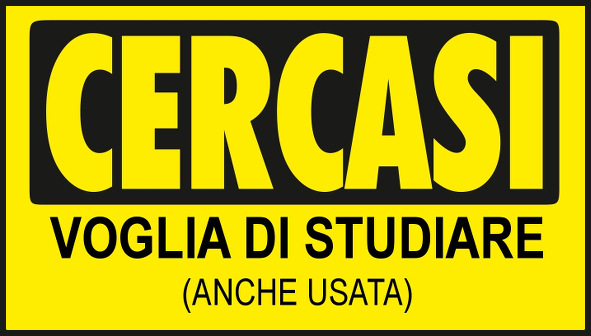I should have studied Italian! Now how would you say that in Italian?

In Search Of – The Will To Study – (Even Second Hand)
This is the second in a series of articles covering the three very important verbi modali (modal verbs): dovere (to have to), volere (to want) and potere (to be able). You can find the first article HERE.
Today we’ll examine the conjugations of the modal verb dovere when used with the auxiliary verbs essere (to be) and avere (to have), and its usage in everyday speech.
It’s important to remember that the modal verbs do not have their own auxiliary verb. The choice of whether to use essere or avere depends on the verb that follows them. Let’s have a look at some practical examples for the main tenses:
Indicativo Passato Prossimo (present perfect indicative):
Examples:
ieri ho dovuto fare la spesa = I had to do the shopping yesterday
Lucia ha dovuto studiare per l’esame = Lucia had to study for her test
Marco è dovuto tornare a Roma un giorno prima = Marco had to go back to Rome one day earlier
purtroppo Mario e Lucia sono dovuti andare via presto = unfortunately Mario and Lucia had to leave early
Condizionale Passato (past conditional):
Examples:
avrei dovuto studiare l’italiano = I should have studied Italian
Lucia avrebbe dovuto fare la spesa ieri = Lucia should have done the shopping yesterday
Maria sarebbe dovuta restare in Inghilterra un’altra settimana = Maria should have stayed in England for another week
saremmo dovuti tornare a casa prima che facesse buio = we should have got back home before dark
To find out more about the past conditional see this post: Condizionale Passato
Congiuntivo Passato (past subjunctive):
Examples:
sembra che Giorgio abbia dovuto comprare una macchina nuova = it seems that Giorgio had to buy a new car
mi dispiace che tu abbia dovuto scomodarti per me = I’m sorry that you had to put yourself out/go out of your way for me
Lucia pensa che Maria sia dovuta tornare a casa = Lucia thinks that Maria had to go back home
è un peccato che siate dovuti partire presto = it’s a pity that you had to leave early
To find out more about the past subjunctive see this post: Congiuntivo Passato
Congiuntivo Trapassato (pluperfect subjunctive):
Examples:
pensavo che Maria fosse dovuta tornare a Genova per motivi di famiglia = I thought that Maria had had to go back to Genoa for family reasons.
se fossimo dovuti andare a Napoli ci sarebbe piaciuto visitare Ercolano = if we had had to go to Naples we would have liked to visit Herculaneum.
si diceva che Giovanni avesse dovuto subire un trapianto di cuore = it was said that Giovanni had had to undergo a heart transplant
avevamo paura che tu avessi dovuto lasciare il tuo lavoro = we were worried that you had had to leave your job.
To find out more about the pluperfect subjunctive see this post: Congiuntivo Trapassato
Next time I’ll be looking at the conjugation and use of the modal verb potere.
A presto!






Comments:
Charlie DeWeese:
“Maria sarebbe dovuta restare in Inghilterra un’altra settimana = Maria should have stayed in England for another week”
Questa frase (un’altra settimana) è meglio di “una settimana di più”? O uguale? Mi sembrava che “un’altra settimana” fosse simile a “una settimana diversa”. Sono sbagliato?
Serena:
@Charlie DeWeese Salve Charlie!
“Maria sarebbe dovuta restare in Inghilterra un’altra settimana = Maria should have stayed in England for another week”. E’ corretto dire “una settimana di/in più”. Comunque “un’altra settimana” in questo caso non vuol dire “diversa” ma “ancora una settimana” (one week more). Per esempio si dice anche: “vuoi altra pasta?” invece di “vuoi ancora pasta?” (Do you want some more pasta?)
P.S. In italiano diciamo “ho sbagliato?” e non “sono sbagliato?”
Saluti da Serena
Susanna Janssen:
Eccelente lezione!
Maria Powell:
I love all your blogs but these two are absolutely brilliant.
Many thanks
Maria
helen williams:
I love this blog and the grammar explanations – thank you.
I hope I will soon have the courage to comment in Italian.